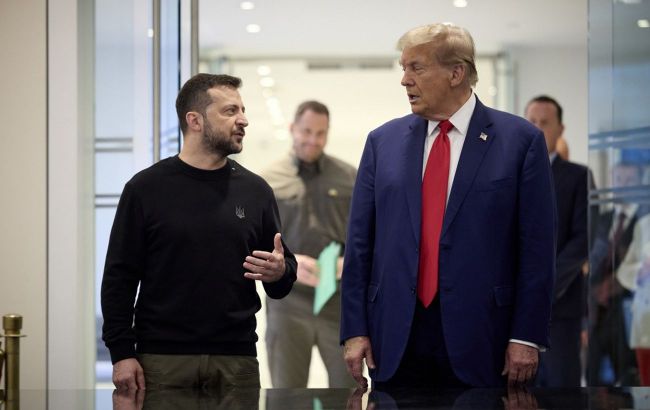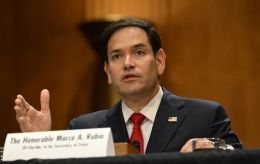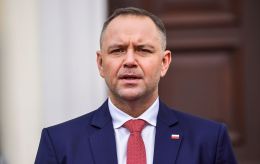Tough conditions and 100% US share - Western media about Ukraine's minerals deal
 Tension between Volodymyr Zelenskyy and Donald Trump over minerals deal (photo: president.gov.ua)
Tension between Volodymyr Zelenskyy and Donald Trump over minerals deal (photo: president.gov.ua)
Today, the media have issued several publications about the upcoming minerals agreement between Ukraine and the United States. The draft of which, however, in its current version not only does not contain security guarantees but has become even tougher. RBC-Ukraine has collected the main insights.
Content
- Where are the negotiations on the deal
- How is the Trump administration trying to push
- Has the deal gotten tougher? What is known so far
- What Ukrainian officials say about the deal
At what stage are the negotiations on the deal
The day before, US President Donald Trump and his National Security Advisor Mike Waltz made several statements regarding the mining agreement with Ukraine, which generally boiled down to the fact that it was close to being concluded and that President Volodymyr Zelenskyy should sign it as soon as possible.
However, according to Sky News, citing sources, he is still not ready to sign, and the Ukrainian side is trying to resolve the disputed issues.
"The agreement is not yet ready for signing, there are a number of problematic issues, and in the current form of the draft, the president is not ready to accept it. Today, the drafts do not reflect the partnership in the agreement and contain only unilateral obligations of Ukraine," the source said.
According to The Wall Street Journal, the negotiations are approaching the final stage and the agreement could allegedly be signed as early as today, February 22. It was reported that the process was accelerated by the visit of US Special Representative Keith Kellogg to Kyiv.
However, according to Fox News journalist Nana Sajaya, the Ukrainian side has only submitted new counterproposals to the United States. Presumably, Kellogg is taking them to the White House. According to her, no specific timeframe for further steps has been determined yet. And if an agreement is reached, the document will be signed by US Secretary of State Marco Rubio and Ukrainian Foreign Minister Andriy Sybiga.
Bloomberg's sources confirm that negotiators need more time. The publication, citing a source familiar with the negotiations, notes that ideally, Kyiv would like the agreement to be signed in the presence of Trump and Zelenskyy. At the meeting with Kellogg, the latter insisted on meeting with the US president before Russian dictator Vladimir Putin met with him.
How the Trump administration is trying to push
The details of the agreement under discussion are mostly disclosed in leaks in the Western media. At the same time, it is reported that the Trump administration is using leverage in the negotiations, which could prove critical for Ukraine.
According to Reuters, after Zelenskyy rejected Treasury Secretary Scott Bessent's initial offer, US officials raised the question of a possible cutoff of Ukraine's access to the Starlink satellite Internet system, which, in particular, provides communications for the military on the front line. And allegedly with the wording "inevitable disconnection of the service" if Kyiv does not agree to a deal on mineral resources.
"Ukraine works on Starlink. They consider it their North Star. Losing Starlink... would be a huge blow," Reuters quoted its source as saying.
The Ukrainian Embassy in Washington, the White House, the Pentagon, and SpaceX did not respond to requests for comment.
Today, the head of the Center for Countering Disinformation at the National Security and Defense Council, Andriy Kovalenko, said that the news about Starlink "definitely does not mean that everything is lost."
"First of all, it is not disconnected. Secondly, there are alternative things that work at the front," he wrote on Telegram.
Poland's Minister of Digitalization Krzysztof Gawkowski has no idea how one can decide to terminate a commercial agreement for services paid for by his country. It is worth noting that Poland once purchased thousands of Starlink terminals for Ukraine and still pays for satellite internet services.
Has the agreement become more stringent? What is known at the moment
Last week, President Zelenskyy rejected the Trump administration's first proposal for a minerals deal. It envisioned a 50% share of the sale of licenses and other future revenues from the extraction of critical minerals such as graphite, uranium, titanium, and lithium. This option also covered revenues from oil, gas and ports.
The refusal was dictated by the fact that the United States did not offer specific security guarantees in return, and the agreement in that form would in principle violate Ukrainian laws. Since then, disagreements between Trump and Zelenskyy have intensified, particularly in the public sphere. Kyiv claimed that it had made "mutually beneficial" changes, after which Washington sent an allegedly "improved" version.
However, according to The New York Times, which cites the draft, the revised agreement sets even stricter requirements than before. At the same time, it does not provide any security guarantees in return.
The terms of the new offer require Ukraine to give up half of its revenues from natural resources, including minerals, gas and oil, as well as revenues from ports and other infrastructure. Four NYT sources confirmed that these demands remained unchanged.
Ukraine had offered the prospect of partnership as a way to persuade Trump to provide additional support for its military efforts, as well as to provide guarantees against potential future Russian aggression if a peace deal is concluded soon. But the new document does neither.
The draft says that income will be directed to a fund in which the United States has a 100% financial stake. And that Ukraine should make contributions to this fund until it reaches $500 billion. This amount is more than twice the size of the pre-war Ukrainian economy and was not mentioned in the previous version.
It is assumed that the United States may reinvest part of the proceeds in Ukraine's post-war recovery. In particular, by investing in the development of subsoil and infrastructure.
The draft also includes provisions on revenues from the territories occupied by Russia in case of their liberation. In this case, the share of revenues from resources from these territories will be 66%. Thus, Ukraine and the United States will contribute in a ratio of 2:1, with the Ukrainian side contributing 2/3 and the US side contributing a third, which it has already provided in the form of military aid.
Also, one of the few changes was the removal of the clause on the transfer of the agreement to the jurisdiction of the US court. Previously, it had caused concern in Kyiv, as it could weaken Ukraine's legal position in controversial issues.
The Trump administration believes that the very presence of American economic interests in Ukraine is a guarantee of security for Kyiv.
According to other media outlets, Kyiv is proposing to revise the size of the fund and stipulate that the money in the fund be used exclusively for investments in Ukraine. And those allegedly involved in the negotiations are inclined to believe that an agreement will have to be concluded in this form to unblock work on a peaceful settlement.
CNN, citing a source familiar with the negotiations, writes that the draft agreement "is not one that President Zelenskyy would accept."
"It's a strange proposal - to try to take from a country that has been a victim of war more than it cost to defend it," the source added.
What Ukrainian officials say about the deal
Ukrainian officials have been cautious about commenting on the agreement with the United States, let alone disclosing all the nuances. This week, after meeting with Kellogg, Prime Minister Denys Shmyhal said that the economy is running on a war footing and that the government is ready to work with the Trump administration "to achieve pragmatic and mutually beneficial results for our countries."
On Thursday, President Zelenskyy called the talks with Kellogg encouraging and added that Ukraine "needs strong agreements with America that will really work."
"I instructed them to work quickly and very, very carefully. Economy and security should always go hand in hand, and the details of the agreements matter: the better the details are, the better the result," he said.
Today, in an interview with NHK, the parliament Speaker Ruslan Stefanchuk emphasized that Ukraine is ready to work with partners, but wants to receive specific security guarantees. According to him, a governmental expert group will begin serious work on the agreement on February 24, 2025.
Sources: Sky News, CNN, Bloomberg, The New York Times, and The Wall Street Journal.

